| Dhyan Chand's Towering Legacy To Sports In India |
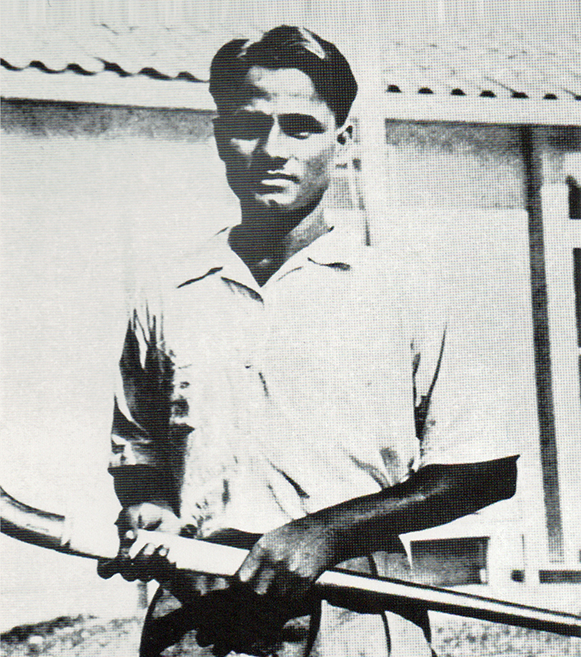
Article by K. Arumugam in India
Today's special issue on 60 Greatest Indians
Photograph of Dhyan
Chand courtesy The Hockey Museum
 ndia's
glorious hockey journey - a medal in every Olympics from 1928 to 1980
except once in 1976, including eight gold - would not have started but
for a friendship between two British Colonels who were part of the
Gallipoli tragedy during the First World War. ndia's
glorious hockey journey - a medal in every Olympics from 1928 to 1980
except once in 1976, including eight gold - would not have started but
for a friendship between two British Colonels who were part of the
Gallipoli tragedy during the First World War.
Their friendly gesture resulted in an Indian Army hockey team's tour
of New Zealand in 1926 - also a maiden foreign visit by any Indian
hockey team. Even as the hosts were amazed at the classic hockey being
showcased in front of their eyes, the visitors realised that they were
indeed a world apart.
One man who mesmerised the Kiwis and whose extraordinary skills
spontaneously led the Indians think of taking part in the Olympics, was
Dhyan Chand. In that epoch making motley group of sixteen stick artists,
the 18-year old 'Other Rank' soldier from the Brahmin Regiment stood
out. Not only because he scored the most goals, but for the grace and
ease with which he could do them. Each goal that he scored was a hockey
lesson in itself.
At the next three Olympics from 1928 to 1936, in which India strode
like a colossus, Dhyan Chand lived up to his reputation, and faith
reposed by the Indian Hockey Federation - it never called him for
selection trials. Defending Olympic hockey champion England, after
entering the 1928 Olympics, made a hasty retreat after seeing the likes
of Dhyan Chand at Folkstone Festival Hockey en route Amsterdam.
It was a rare historical occurrence when a colonized country could
keep out an empire as mighty as the British Empire from a particular
sport for three Olympics.
Jesse Owen's exploits at the 1936 Berlin Olympics came for cornucopia
of accolades, filling every Olympic historian's work, as his feats were
construed as a worthy a rebuff to the emerging Nazi tendencies.
What about Dhyan Chand? He not only had scored 20 goals in the
previous two Olympics, but scored a mind boggling number at Berlin too,
including three in the final against Germany, pricking their ego in a
big way. Olympic records credit him with six out of eight goals that
India scored in the final, but in his autobiography 'Goal' he claims
only three - and this honesty is greatness of this humble genius.
Equally interesting is how this ordinary Indian, who 'could just read
and write' - this is how he describes himself in his autobiography - wrote the
destiny of global hockey, while also breaking the mental block of those
who managed the sports in his era.
This was because only hi-profile players were made the team captains.
Jaipal Singh, the 1928 Olympic captain was not even residing in India,
but was a student at the Oxford University when he got this honour. His
successor for the 1932 Olympics, Lal Shah Bokhari, would hardly match
the calibre of players in the team. But the greenhorn who would later
become Pakistan's High Commissioner in Ceylon, got the nod. Neither did
Jaipal nor Bokhari played their second Olympics is the case in point.
Therefore, when he was made the captain in his third Olympics, Dhyan
Chand considered it a greater moment in his life than when he was
selected for the first Olympics.
Dhyan Chand's legacy is not just confined to pre-Independent era.
After the 'World's Biggest Divorce', as Partition was quoted in "Freedom
at Midnight", when even furniture in government offices was counted and
allocated between the two countries, strong claims were made to declare
India's three Olympic Golds neutral, like British India or Undivided
India.
They had a strong case. The 1936 Berlin Olympic Indian hockey team of
18 was a diverse group, with 14 of the players comprising eight Anglo
Indians, four Muslims, and two Hindus who hailed from the Pakistan
region. Free India won that war on claiming those 3 pre-Independent
Olympic medals, as all of those 14 souls dwarfed against the towering
dinosaur, Dhyan Chand.
And this man, oblivious of his significance, claims in 'Goal': "I
realise that I am not a very important man, good enough to write an
autobiography." Will such a soul ever cease to radiate or fail to
illuminate the Indian nationhood?
|
| The Scot Who Became The First President Of The Indian Hockey Federation |
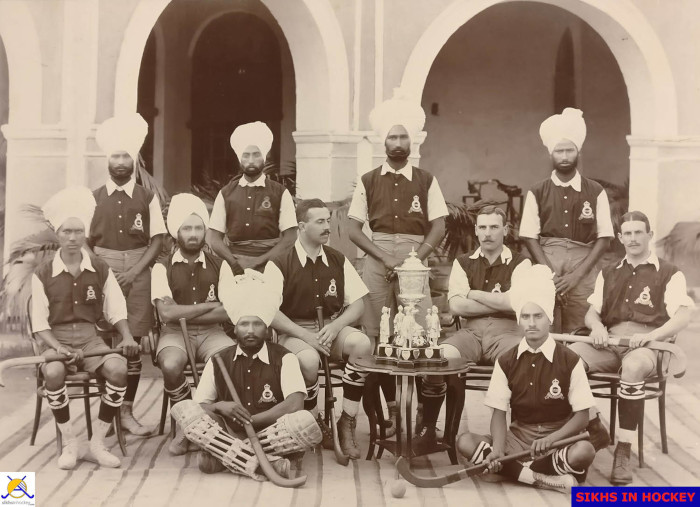
23rd Sikh Pioneers Hockey Team, 1904. Bruce
Turnbull is seated third from left
Article by Diljit Singh
Bahra of Sikhs In Hockey, courtesy
Stick2Hockey.com
 he
formation of the Indian Hockey Federation (IHF) took place 95 years ago
in 1925, and was a turning point in the history of Indian Olympic
Movement. Hockey historian Dil Bahra of London provides well researched
insights on Col. Bruce Turnbull, the first President of the newly formed
IHF. he
formation of the Indian Hockey Federation (IHF) took place 95 years ago
in 1925, and was a turning point in the history of Indian Olympic
Movement. Hockey historian Dil Bahra of London provides well researched
insights on Col. Bruce Turnbull, the first President of the newly formed
IHF.
Bruce Turnbull was born in Khadki (known in those days as Kirkee)
near Pune (formerly Poona), India on November 4, 1880. His father, Peter
Stephenson Turnbull, was Surgeon Major General of the Indian Medical
Service in Mumbai (formerly Bombay) in 1893.
He was educated at Merchiston Castle School in Edinburgh from 1891 to
1896. He enlisted at Royal Military College, Sandhurst, where he learned
to play hockey which was a very popular sport there. He was gazetted as
an Under Officer into the Indian army as a 19-year-old on July 28, 1900.
As a British officer in the Indian Army, he passed Urdu and Punjabi
language examinations.
Turnbull played hockey for his regimental team, the 23rd Sikh
Pioneers, and was one of three British officers who were in team that
won the Punjab Native Army tournament in late 1904.
He was part of the 23rd Sikh Pioneers contingent at the Delhi Durbar
in December 1911, and was awarded the Delhi Durbar Medal.
He was on leave in the UK at the outbreak of the Great War (World War
I) in August 1914. He volunteered his services to the Army. He went on
to serve with the 15th and 47th Sikhs in France and Belgium.
He was wounded in France in 1914 when he sustained a gunshot wound to
his left jaw which required him to be transferred to a military hospital
in the UK. He was with the 47th Sikhs during the second battle of Ypres
in France in 1915, where he was badly wounded in the attacks of the
Ferozepore and Jullundur Brigades. Turnbull was admitted to a military
hospital in the UK for a second time in a short spell.
Having recovered from his wounds at Ypres, he was appointed Brigade
Major of the 202 Infantry Brigade, a training unit based in Kent.
He was appointed as Inspector of Physical Training at the Military
Training Directorate, Army Headquarters, India in 1922. With this post,
Turnbull also became the Honorary Secretary of Army Sports Control
Boards, India. In June 1923, he was promoted to Colonel. Turnbull was
elected as the first President of the IHF on 7th November, 1925.
Turnbull retired from the Indian Army in June 1926. Returning home to
Scotland after his retirement, he took up a position with the Edinburgh
Education Authority in 1928.
He was the business manager of the Indian team which won the gold
medal at the 1928 Amsterdam Olympic Games. Turnbull officiated at the
Games and umpired the bronze medal match between Germany and Belgium.
Turnbull was appointed to the International Hockey Federation (FIH)
Council in May 1928, and served on the Committee until 1932.
He was elected President of the Scottish Hockey Association from
1935-37. Turnbull umpired regularly in Scotland, and at the Berlin 1936
Olympic Games he was appointed as a member of the Jury of Appeal and an
umpire at the matches. In 1935 he published the booklet "Hockey Hints".
He remained committed to hockey throughout his life. In 1950 he
presented hockey trophies to the winning Edinburgh University team, and
in 1951, he was the Honorary President at the Scottish Hockey's silver
jubilee celebrations.
Bruce Turnbull died peacefully at home on 21st January, 1952, in
Edinburgh, Scotland.
|
| Indian Men's Hockey's Domination In The Olympic Games |
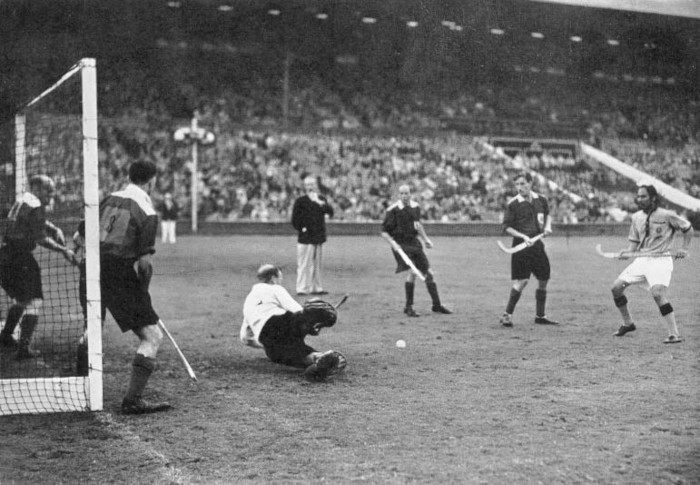
Balbir Singh Sr. in the 1948 London Olympics hockey competition. Statistics courtesy
Scroll.in
 ndian
men's hockey's towering record in Olympic hockey can be seen in the
stastics below. This extent of world domination is partly the reason
hockey is considered India's national game. ndian
men's hockey's towering record in Olympic hockey can be seen in the
stastics below. This extent of world domination is partly the reason
hockey is considered India's national game.
1. Most Medals in Olympic Hockey
| Rank |
Country |
Gold |
Silver |
Bronze |
Total |
| 1 |
India |
8 |
1 |
2 |
11 |
| 2 |
Pakistan |
3 |
3 |
2 |
8 |
| 3 |
Great Britain |
3 |
2 |
4 |
9 |
2. Most Wins in Olympic Hockey
| Rank |
Country |
Wins |
| 1 |
India |
76 |
| 2 |
Netherlands |
73 |
| 3 |
Pakistan |
70 |
3. Most Goals in Olympic Hockey
| Rank |
Country |
Goals |
| 1 |
India |
433 |
| 2 |
Netherlands |
306 |
| 3 |
Australia |
302 |
4. Most Consecutive Medals in Olympic Hockey
| Rank |
Country |
Consecutive Medals |
Medals |
Years |
| 1 |
India |
10 |
7G, 1S, 2B |
1928 - 1972 |
| 2 |
Pakistan |
6 |
2G, 3S, 1B |
1956 - 1976 |
| 3 |
Australia |
6 |
1G, 1S, 4B |
1992 - 2012 |
5. Most Consecutive Gold Medals in Olympic Hockey
| Rank |
Country |
Consecutive Golds |
Goals |
| 1 |
India |
6 |
1928 - 1956 |
| 2 |
Netherlands |
2 |
1996, 2000 |
| 3 |
Germany |
2 |
2008, 2012 |
6. Other Records in Olympic Hockey
| Rank |
Record |
Number |
Description |
| 1 |
Most Appearances in Olympic Men's Hockey |
20 |
1928 - 2004, 2012 - 2016 |
| 2 |
Most Goals Scored in a Single Olympics |
43 |
1980 Moscow Olympics |
| 3 |
Least Goals Conceded in a Single Olympics |
0 |
1928 Amsterdam, 1956 Melbourne |
| 4 |
Biggest Winning Margin in an Olympic Game |
IND 24 - USA 1 |
1932 Los Angeles Olympics |
| 5 |
Biggest Winning Margin in an Olympic Final |
IND 8 - GER 1 |
1936 Berlin Olympics Final |
| 6 |
Most Goals Scored in an Olympic Final |
5 (Balbir Singh Sr.) |
1952 Helsinki Olympics Final |
The last of India's hockey medals was won on July 29, 1980 at Moscow. India's grip on the sport
slipped so much in recent years that the Indian men's hockey team failed to qualify for the
2008 Beijing Olympics, and finished last in the Olympics in the 2012 London Olympics.
Based on its no. 4 world ranking, and relatively good performances in
the recent (pre-Covid) months, the Indian hockey team will be looking to
Tokyo to get back on the Olympic hockey podium. It has been a long wait
of 40 years and counting for the nostalgic Indian hockey fans.
|
| Time Running Out For Hockey India's Narinder Batra and Elena Norman |
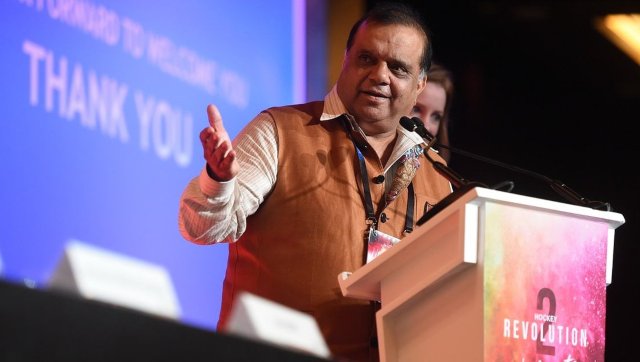
Article courtesy First Post, Photograph credit FIH
 ormer
Olympian Aslam Sher Khan, has petitioned Delhi High Court to quash
articles in Hockey India's (HI) Memorandum of Association (MOA) under
which the posts of 'life member', 'life president' and
'CEO', all with unlimited tenure and full voting rights, have
been created. ormer
Olympian Aslam Sher Khan, has petitioned Delhi High Court to quash
articles in Hockey India's (HI) Memorandum of Association (MOA) under
which the posts of 'life member', 'life president' and
'CEO', all with unlimited tenure and full voting rights, have
been created.
Senior advocate Gopal Sankaranarayan, appearing for the petitioner,
said these posts are in violation of the National Sports Code of 2011,
which specifies the rules, circulars and guidelines for the functioning
of the national sports federations (NSFs).
The petition, filed through advocate Vanshdeep Dalmia, has sought
quashing of the appointments of 'life member' Narinder Dhruv
Batra and 'CEO' Elena Norman. The petition contends that a
similar post of 'life member' in the Amateur Kabaddi Federation
of India has been quashed by the High Court.
1975 World Cup winning team member Aslam Sher Khan also alleged in
his plea "various acts of nepotism and favouritism" by Batra and Norman
were "causing loss, financial and otherwise to the sport of hockey". The
plea has sought directions to Batra and Norman to provide accounts of
money and financial benefits received by them from HI from their time of
appointment, and to refund the same.
Khan has also sought a direction to the Sports Ministry to cancel
HI's affiliation to the Indian Olympic Assocation, terminate the
appointments of Batra and Norman, and for fresh elections to be held.
Until then, the plea has asked for an administrator or ad-hoc committee
of eminent sportspersons be appointed to run the affairs of HI.
The Delhi High Court Thursday has issued notice to the Sports
Ministry, HI, 'life member' Narinder Batra and 'CEO'
Elena Norman, seeking their stand on the petition by 28th September.
|
| Photograph of the Month |
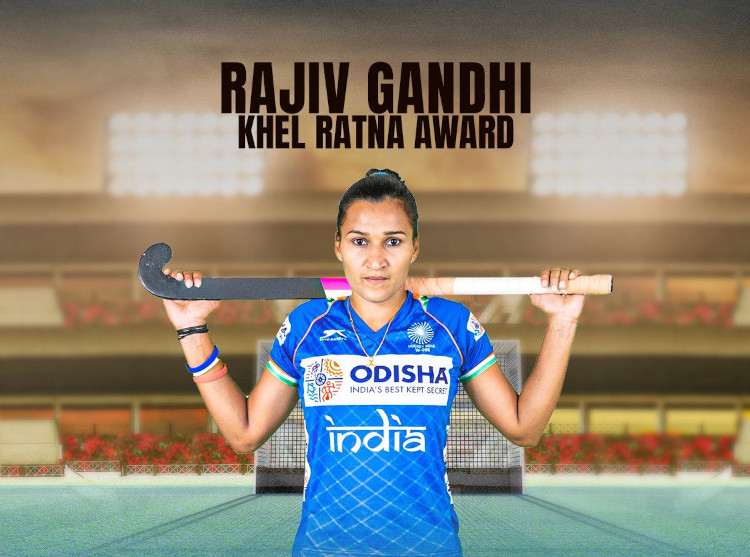
Photograph credit Rani
Rampal's Twitter Account
 ndian
women's hockey team captain Rani Rampal has got the coveted Rajiv Gandhi
Khel Ratna Award for 2019. She is only the third hockey player to be so
honoured, after Dhanraj Pillai and Sardar Singh. ndian
women's hockey team captain Rani Rampal has got the coveted Rajiv Gandhi
Khel Ratna Award for 2019. She is only the third hockey player to be so
honoured, after Dhanraj Pillai and Sardar Singh.
The 25-year-old had helped the Indian team secure a berth at the
Tokyo Olympics with the tie-breaking goal in the two-match Olympic
qualifier against United States, and also led the side to the silver
medal at the 2018 Asian Games in Jakarta.
Besides Rani Rampl, the sport of hockey had the following awardees:
- Arjuna Puraskar: Akashdeep Singh, Deepika Thakur
- Dronacharya Puraskar: Jude Felix Sebastian
- Dronacharya Puraskar (Lifetime Achievement): Romesh Pathania
- Dhyan Chand Puraskar for Lifetime Achievement in Sports and Games: Ajit Singh
Rani Rampal, who is currently based out of the SAI Centre in
Bengaluru, said upon winning the award, "It is a really proud moment for
me and my family as well. I owe this prestigious award to my coaches,
teammates, friends and family for their constant support since the very
beginning. This award will serve as a great motivation for me and
players like me to keep striving for bigger feats and make the country
proud."
Due to the COVID-19 pandemic, the awards will be held virtually for
the first time on August 29, National Sports Day, instead of the
Rashtrapati Bhavan.
|
| Money Matters |
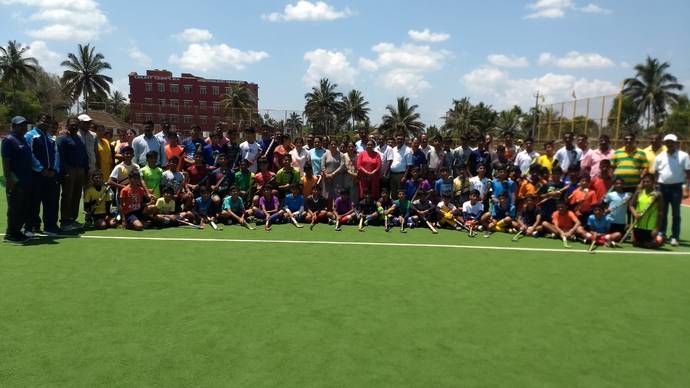
Article and Photograph of the Naval Tata Hockey Academy courtesy
Sportstar
 fter
starting with a girls program of 30 trainee cadets capacity, the Naval
Tata Hockey Academy Odisha (NTHAO), is all set to induct 30 boys in the
coming months. fter
starting with a girls program of 30 trainee cadets capacity, the Naval
Tata Hockey Academy Odisha (NTHAO), is all set to induct 30 boys in the
coming months.
Odisha Sports Minister Tusharkanti Behera said, "The boys program
will have 30 resident cadets from u-17 level. We will source players
from our 10 Grassroots Centres that are operational in Sundargarh and
Sambalpur districts, and our 3 Regional Development Centres that are in
Bhubanesvar, Panposh and Sundergarh."
The minister added, "The newly launched initiative of the Department
of Sports and Youth Services, Govt. of Odisha, to set up a number of
synthetic turfs in identified locations of Sundergarh will keep Odisha
ahead of its hockey journey. These are very productive times for hockey
in the state, and for the youth of the state."
Odisha has a history of producing Olympians, including legendary
defender Dilip Tirkey, Lazarus Barla, Birendra Lakra and Amit Rohidas,
to name a few.
NTHO project director Rajiv Seth said, "A professional High
Performance Centre like NTHAO will provide advanced level training to
the cadets under a resident program. Scouting programs and various
trials were carried out in Rourkela, Assam, North-East, Kodagu and other
hockey hubs to identify cadets for training. We plan to have a 60%-40% ratio of local Odisha talent to
pan-India talent in the academy."
Seth signed off, "We have installed an enormouse number of facilities
across multiple sports here in the Kalinga Stadium in a short span of
time. Bhubanesvar has truly become a sporting capital of the nation."
|
| Media Matters |
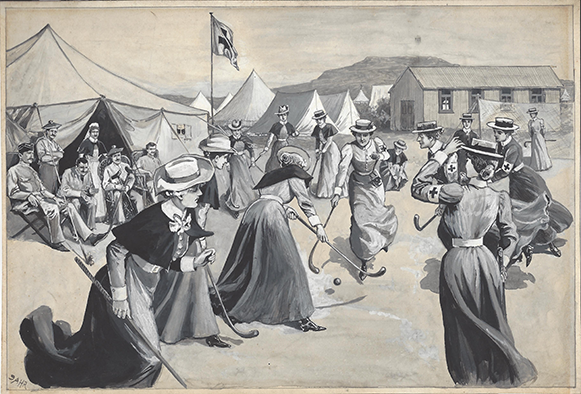
Photograph credit Hockey Museum
 webinar
titled 'Hockey Through the Ages' was organised by The Hockey Museum on
30th July, in partnership with the FIH World Hockey membership scheme. webinar
titled 'Hockey Through the Ages' was organised by The Hockey Museum on
30th July, in partnership with the FIH World Hockey membership scheme.
Fans from all five continents were present for the 90-minute webinar,
which saw Mike Smith, the museum's curator and Founding Trustee, in
conversation with Simon Mason, the FIH broadcast commentator who played
in goal for Great Britain at the 1996, 2000 and 2004 Olympic Games.
The above is an artefact from the museum's extensive collection of
rare hockey photographs. The Hockey Museum is based in Woking, a town in
Surrey, England.
|
| Fun With Numbers |

Statistics by B. G. Joshi
 he
September 2020 edition of Fun with Numbers is on Indian internationals who
achieved the double distinction of 100+ matches and 100+ goals. One gets
just a handful of goal scoring chances in international matches, and only a
percentage of which get converted to goals. To score a century of goals is a
matter of distinction. he
September 2020 edition of Fun with Numbers is on Indian internationals who
achieved the double distinction of 100+ matches and 100+ goals. One gets
just a handful of goal scoring chances in international matches, and only a
percentage of which get converted to goals. To score a century of goals is a
matter of distinction.
In the era of the great Dhyan Chand (1926-1947) and Balbir Singh Sr.
(1947-1958), national teams used to compete in the Olympics only (Asian
Games hockey just started in 1958). When Indian teams toured abroad in
those times, they used to play a mix of international matches and games against local clubs. Therefore, Dada Dhyan
Chand's Balbir Singh Sr.'s goal-scoring feats do not feature in the
records, despite their phenomenal strike rate (570 goals in 185 matches
for Dhyan Chand, and 246 goals in 61 matches for Balbir Singh Sr.).
Men's Hockey
- In men's hockey, Pakistani centre-forward Abdul Rashid Jr.
(1966-1976) was the first to score 100 international goals
- The world record for goals scored in men's hockey is held by
Pakistan's penalty corner specialist Sohail Abbas, with 346 goals
- The world record for maximum internationals played in men's
hockey is held by Dutch striker Teun de Nooijer, with 453 caps
- 4 Indian players have achieved the double of 100+ matches and
100+ goals in men's hockey - Sandeep Singh, V. R. Raghunath,
Rupinderpal Singh and Dhanraj Pillai
| Player |
Date of Birth |
Career Duration |
Caps |
Goals |
| Sandeep Singh |
Feb 27,1986 |
2004-2013 |
182 |
138 |
| V. R. Raghunath |
Nov 1,1988 |
2006-2015 |
228 |
132 |
| Rupinderpal Singh |
Nov 11,1990 |
2010-active |
215 |
125 |
| Dhanraj Pillai |
Jul 16,1968 |
1989-2004 |
339 |
121 |
Women's Hockey
- In women's hockey, Dutch centre-forward Fieke Boekhorst
(1976-1988)) was the first to score 100 international goals
- The world record for goals scored in women's hockey is held by
South Africa's Pietie Coetzee, with 282 goals
- The world record for maximum internationals played in women's
hockey is held by German striker Natascha Keller, with 425 caps
- Only 1 Indian player has achieved the double of 100+ matches and
100+ goals in women's hockey - present Indian captain Rani Rampal
| Player |
Date of Birth |
Career Duration |
Caps |
Goals |
| Rani Rampal |
Dec 4,1994 |
2009-active |
241 |
128 |
|
![]()